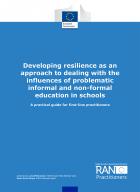Details
- Publication date
- 24 May 2022
- Author
- Directorate-General for Migration and Home Affairs
- RAN Publications Topic
- Formal/informal education
Description
The role of education is not only to teach pupils subjects such as Maths, Biology and English, but to foster critical thinking and support children and adolescents to become responsible members of democratic societies. Education doesn’t only take place in schools and other state regulated surroundings, which are bound to democratic values and human rights, but also in non-formal and informal surroundings which may or may not convey these values. Sometimes these surroundings can lead to problematic effects on individuals and contribute to the breeding ground for radicalisation and violent extremism.
With the goal of preventing and countering such outcomes, this handbook provides guidelines on how to identify and deal with problematic non-formal1 and informal education. Nowadays, non-formal and informal education are having an increasingly strong impact on children and young adults. This is beneficial only if the education is bound to democratic values and supports the upbringing of responsible citizens within a democratic society, thereby contributing to the prevention and countering of violent extremism (P/CVE). However, it may undermine society if this non-formal or informal education contradicts democratic values. Furthermore, problematic non-formal or informal education can exclude pupils from democratic formal learning processes in schools.
Therefore, it is crucial to provide first-line practitioners with information about problematic non-formal and informal education and to promote useful concepts to support fruitful interaction between formal, non-formal and informal education. This handbook is written for first-line practitioners working with pupils between the ages of 10 and 18. It is primarily aimed at teachers who, in their function, are also the link between informal and formal education. Since teachers can act as the confidants of adolescents, they are (ideally) not only imparters of knowledge but also democratic role models and mediators of values. it is the teachers who decide what tone to adopt in classroom discussions and what topics to address.
This handbook provides information on how adolescents develop socially, how problematic education can influence them, and how teachers can get support from appropriate cooperation partners. These partners can be experienced and trained first-line practioners, field experts, civil society organisations and local authorities, among others, which will provide tools and guidelines for teachers to better prevent and counter any challenge that informal education might pose in the classroom. There are many and varied sources of problematic non-formal and informal education. This makes it difficult for teachers to recognise which approaches are helpful in developing resilence and where to begin.
Therefore, this handbook starts with the basic developmental processes of young people. Teachers need to keep these in mind in order to specifically address their pupils with the appropiate narrative. Furthermore, the handbook presents requirements that must be met by cooperation partners, in order to positively influence the social development of adolescents. Cooperation partners can be a helpful bridge between non-formal and formal education. That is why three approaches, which have been successfully used in schools throughout Europe, are included in the handbook to exemplify successful cooperations. The methods included can also be used by teachers to address difficult topics within the classroom.

